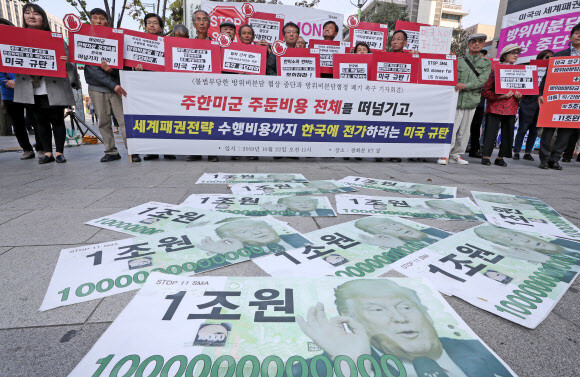hankyoreh
Links to other country sites 다른 나라 사이트 링크
S. Korea, US begin defense cost-sharing negotiations in Honolulu

Delegations from South Korea and the US are sitting down in Honolulu, Hawaii, from Oct. 22 to 24 to negotiate the two countries’ 11th defense cost-sharing agreement, which will take effect next year. South Korea’s newly appointed chief negotiator Chung Eun-bo and the rest of his team jumped into the negotiations following dinner with the American team on Oct. 22. There’s likely to be a vehement debate over the total amount of South Korea’s defense contribution and the specific categories of expenses included in that amount.
After arriving in Honolulu on Oct. 22, Chung had his first meeting with James DeHart, senior advisor for security negotiations and agreements at the US State Department’s Bureau of Political-Military Affairs, during an unofficial dinner with a small number of guests. The negotiators moved immediately into detailed deliberations on Oct. 23.
During the negotiations, South Korea is likely to push for maintaining the framework of previous cost-sharing agreements, which focus on the categories of labor costs (wages paid to South Koreans employed by US Forces Korea), military construction costs (building facilities inside US military bases), and military supplies and services support cost. The largest increase that the South Korean government is reportedly willing to accept in these negotiations is the rate of increase in domestic defense spending, up 7.4% year on year in the 2020 budget. The calculation of South Korea’s contribution in the 10th cost-sharing agreement (US$886 million), reached early this year, also reflected the rate of increase in defense spending in 2019 (8.2%).
Seoul’s position is that various indices can be treated as a benchmark for calculating the amount of increase in its defense contribution: not only the rate of increase of defense spending, but also the rate of inflation and the rate of increase of gross domestic product (GDP). But given the high rate of increase in defense spending under the current administration, that rate is likely to be the government’s “last line of defense” in setting the total amount of its defense contribution. In short, even if the contribution is increased, the percentage of that increase cannot exceed that rate.
US making demands it never made in past
The US is expected to add new categories of expenses as it argues for the need for a massive increase in the contribution to US$5 billion. During an audit of government activity by the National Assembly’s Legislation and Judiciary Committee on Oct. 18, Democratic Party lawmaker Lee Cheol-hui claimed that the US was asking South Korea to cover costs that had previously been omitted from the cost-sharing agreement or handled separately, including the deployment of strategic assets, joint military exercises, and support for the families of US troops. Those additional costs added up to US$3 billion, Lee said.
“We’re getting demands [from the Americans] that we didn’t used to get,” confirmed South Korean Minister of Foreign Affairs Kang Kyung-wha during an audit at the National Assembly’s Foreign Affairs and Unification Committee on Oct. 21.
On a related topic, it’s widely assumed that no conclusion will be reached about changing the method of calculating South Korea’s defense contribution during this round of negotiations. In the negotiations for the 10th cost-sharing agreement, which ran from last year until the beginning of this year, there was a push to change the calculation method from the current “total amount” to a “needs basis,” in which amounts are calculated for specific needs. While the two governments assigned section chiefs to a working group this June to discuss that idea, the deliberations reportedly didn’t get into much detail because of the limited amount of time available.
“We need to look more carefully into whether a needs basis would actually be beneficial to us,” said an expert who asked to remain anonymous.
By Noh Ji-won, staff reporter
Please direct comments or questions to [english@hani.co.kr]

Editorial・opinion
![[Editorial] Penalties for airing allegations against Korea’s first lady endanger free press [Editorial] Penalties for airing allegations against Korea’s first lady endanger free press](https://flexible.img.hani.co.kr/flexible/normal/500/300/imgdb/original/2024/0502/1817146398095106.jpg) [Editorial] Penalties for airing allegations against Korea’s first lady endanger free press
[Editorial] Penalties for airing allegations against Korea’s first lady endanger free press![[Editorial] Yoon must halt procurement of SM-3 interceptor missiles [Editorial] Yoon must halt procurement of SM-3 interceptor missiles](https://flexible.img.hani.co.kr/flexible/normal/500/300/imgdb/child/2024/0501/17145495551605_1717145495195344.jpg) [Editorial] Yoon must halt procurement of SM-3 interceptor missiles
[Editorial] Yoon must halt procurement of SM-3 interceptor missiles- [Guest essay] Maybe Korea’s rapid population decline is an opportunity, not a crisis
- [Column] Can Yoon steer diplomacy with Russia, China back on track?
- [Column] Season 2 of special prosecutor probe may be coming to Korea soon
- [Column] Park Geun-hye déjà vu in Yoon Suk-yeol
- [Editorial] New weight of N. Korea’s nuclear threats makes dialogue all the more urgent
- [Guest essay] The real reason Korea’s new right wants to dub Rhee a founding father
- [Column] ‘Choson’: Is it time we start referring to N. Korea in its own terms?
- [Editorial] Japan’s rewriting of history with Korea has gone too far
Most viewed articles
- 160% of young Koreans see no need to have kids after marriage
- 2[Editorial] Japan’s rewriting of history with Korea has gone too far
- 3Vietnamese war victims speak of sexual violence by S. Korean troops for the first time
- 4For survivor, Jeju April 3 massacre is a living reality, not dead history
- 5[Column] Park Geun-hye déjà vu in Yoon Suk-yeol
- 6[Reporter’s notebook] In Min’s world, she’s the artist — and NewJeans is her art
- 7[Editorial] Penalties for airing allegations against Korea’s first lady endanger free press
- 8Presidential office warns of veto in response to opposition passing special counsel probe act
- 9Hybe-Ador dispute shines light on pervasive issues behind K-pop’s tidy facade
- 10[Special Feature Series: April 3 Jeju Uprising, Part III] US culpability for the bloodshed on Jeju I